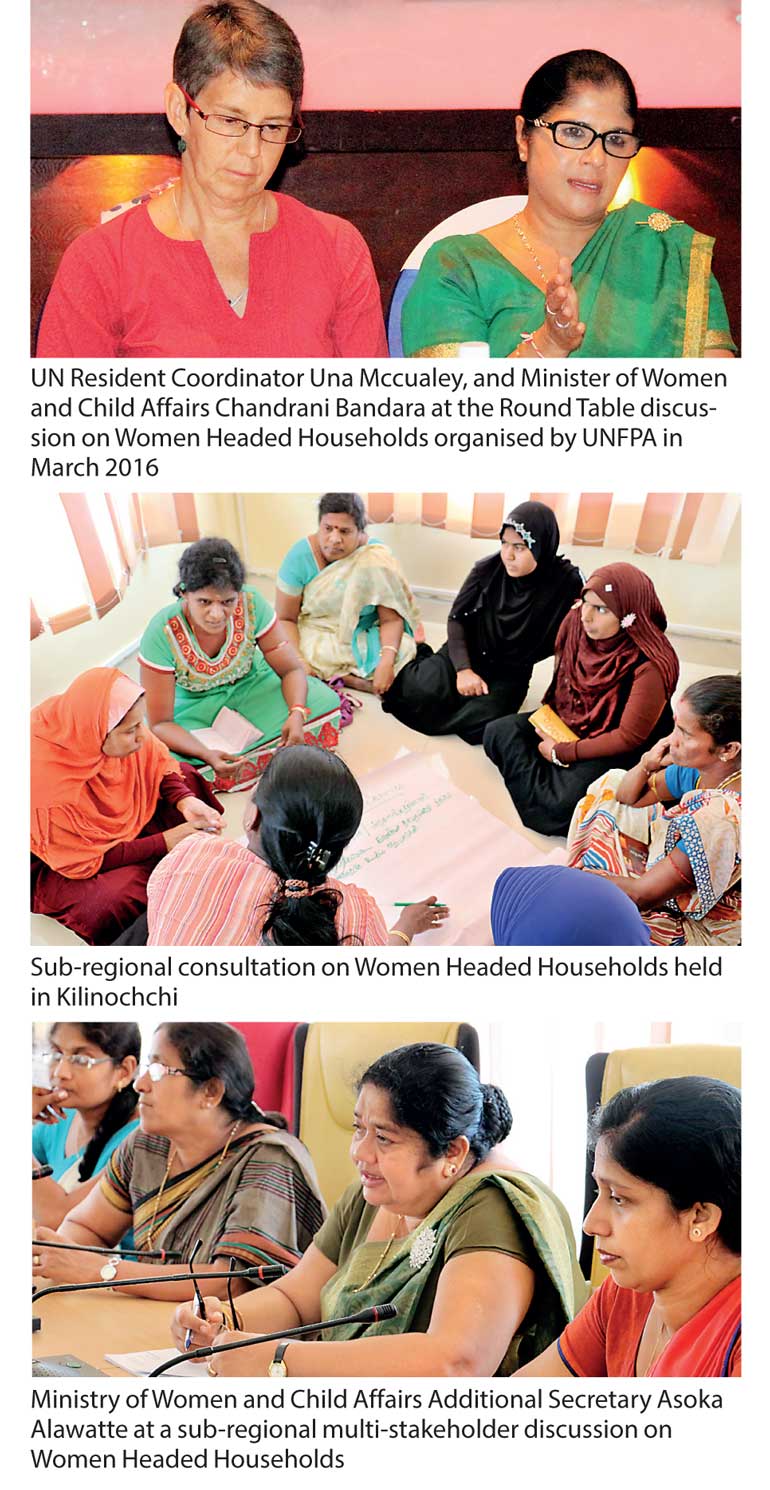Monday Feb 23, 2026
Monday Feb 23, 2026
Friday, 15 September 2017 00:00 - - {{hitsCtrl.values.hits}}
 In Sri Lanka, one in four households are headed by women, of which more than 50% are widowed. Social stigma in male-dominant societies brings about many challenges for women headed households, including increased incidents of gender-based violence, poverty through denied access to land rights, and limited opportunities for livelihood development.
In Sri Lanka, one in four households are headed by women, of which more than 50% are widowed. Social stigma in male-dominant societies brings about many challenges for women headed households, including increased incidents of gender-based violence, poverty through denied access to land rights, and limited opportunities for livelihood development.
The three-decade conflict in Sri Lanka is a leading contributory factor to this socio-economic issue. In 2015, in response to the UN Gender Theme Group’s proposal on women headed households, the Ministry of Women and Child Affairs drafted a National Action Plan for Women Headed Households, with the technical support from the United Nations Population Fund (UNFPA) in Sri Lanka. The National Action Plan provides interventions in six priority areas: (1) health and psychosocial support, (2) livelihood development, (3) support services systems, (4) protection, (5) social security and (6) national level policy formulation.
Further, in March 2016 the UN Gender Theme Group organized a round-table discussion on ‘Empowering Women Headed Households in Sri Lanka’. Speaking at this event, the Minister for Women and Child AffairsChandrani Bandara, said, “Due to the lack of opportunities and services aimed at uplifting livelihoods of women headed households, these women remain vulnerable to conditions of poverty, violence and social exclusion. A comprehensive programme to empower women headed households is a must. It should include efforts to reform policies that contain gaps and limitations.”
Thereafter, UNFPA supported the Ministry of Women and Child Affairs to conduct focused discussions based on the six sectors. The sectoral discussions held earlier this year had the participation of 17 related Ministries, following which high-level meetings with key Ministries such as the Ministry of Rural Economy, Ministry of Agriculture, Ministry of Land and Parliamentary Affairs, Ministry of Prison Reforms, Rehabilitation, Resettlement and Hindu Religious Affairs, and the Ministry of Social Empowerment and Welfare were held in order to make the plan more comprehensive. Furthermore, stakeholder consultations and sub-regional consultations are being conducted around the island, with the engagement of sub-national government officials, representatives from civil society, and women directly affected by the issue.
The discussions are revealing a multitude of challenges for women headed households specifically related to employment and entrepreneurship opportunities. Senthini, a participant of a sub-regional consultation in Kilinochchi said, “It is important that women who are engaged in livelihood activities are also given adequate training. If they receive training and gain access to proper marketing channels, they can establish their products in any market and sustain their livelihoods.”
Another key challenge that was identified through discussions was the issue around land rights and ownership. The Ministry of Land and Parliamentary Affairs highlighted that existing land laws give preference to men and male children, in line with customary law. It was mentioned that necessary action should be taken to address this issue in the National Action Plan for Women Headed Households.
Ritsu Nacken, UNFPA Representative in Sri Lanka, said, “The challenges faced by women-headed households in Sri Lanka must be addressed as a priority. In the journey towards achieving the 2030 Agenda on Sustainable Development it is important that the needs of these women are addressed and that they are given opportunities to contribute to the national development and peacebuilding processes, in ensuring that no one is left behind.”
UNFPA will continue to support the Ministry of Women and Child Affairs in the process of submitting a comprehensive National Action Plan for Women Headed Households to the Cabinet for approval, prior to the initial hearings of the 2018 Budget.